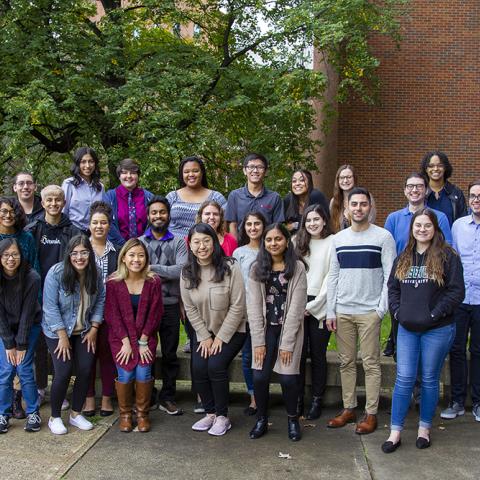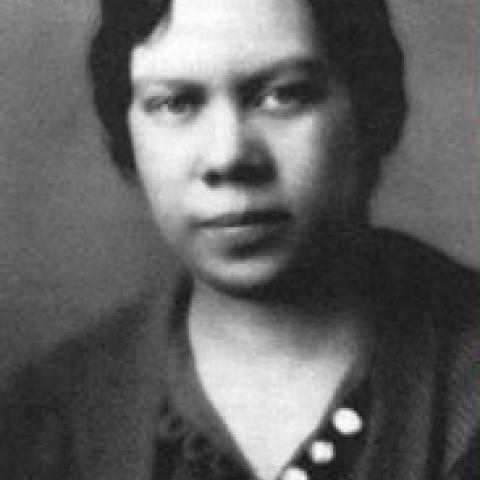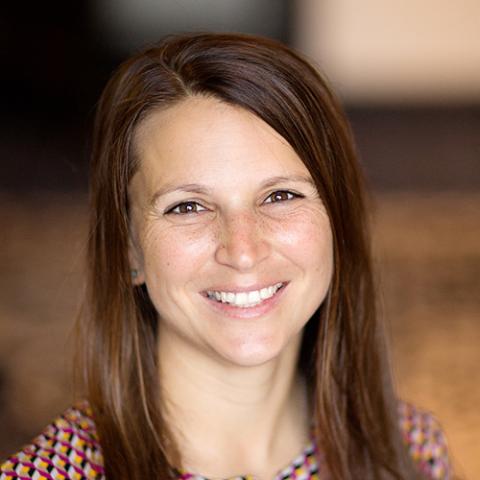Diversity and inclusion
We know that experiences matter and can impact how an individual relates to others and the world around them. We strive to create an inclusive environment where every student, staff member, and faculty member feels valued and has meaningful experiences that affirm and embrace their identities, perspectives, and cultural backgrounds.
You're welcome here
We’re committed to increasing equity and diversity in our undergraduate and graduate academic programs, within our faculty, and in our curriculum, research, and outreach. We’re dedicated to building a culture that’s grounded in principles of equity and social justice and that affirms and embraces the multiple identities, values, perspectives, knowledge, belief systems, and cultural practices of diverse individuals and communities.

Diversity in Psychology Day 2019

Our commitment to anti-racism
Our anti-racism statement outlines our commitment to improving diversity, equity, and inclusion within the department and to contributing to a more just and equitable society.
ICD’s commitment to anti-racism
The Institute of Child Development (ICD) was founded in 1925 with the support of the Laura Spelman Rockefeller Memorial to promote child welfare and wellbeing. The continued discrimination and oppression faced by members of the Black community has compelled us to examine our department's role in perpetuating inequity and systemic racism. For too long, we have not fulfilled our founding charge to improve lives for all children and their families, particularly for members of the Black, Indigenous, and other communities of color. We acknowledge that failure and commit to a new way forward.
We acknowledge that systemic racism against the Black community is pervasive not only in our nation, but also in our local institutions and community, and that we have been complicit in perpetuating those systems. We acknowledge that the University of Minnesota-Twin Cities stands on Miní Sóta Mantiakhóčhe, the homelands of the Dakhóta Oyáte, and that their continued displacement allows the university to remain today. We are committed to creating a welcoming University environment and inclusive culture for Black, Indigenous, and other communities of color.
Diversity and equity work is a daily practice, and we embrace the opportunity to improve upon our past, so we can fulfill our founding ideals and contribute to a more just and equitable society. We will review and expand our current research agendas and contribute to addressing diversity and equity issues in the fields of developmental psychology and early childhood education. We are committed to promoting social justice, adopting anti-racist practices, policies, and procedures, and actively working to dismantle internal systems that perpetuate inequity in our department, university, and society.
Land Acknowledgement
We acknowledge that the University of Minnesota Twin Cities is built within the traditional homelands of the Dakota people. It is important to acknowledge the peoples on whose land we live, learn, and work as we seek to improve and strengthen our relations with our tribal nations.
We also acknowledge that words are not enough. We must ensure that our institution provides support, resources, and programs that increase access to all aspects of higher education for our American Indian students, staff, faculty, and community members.
Resources
University of Minnesota
- College of Liberal Arts, American Indian Studies, Community Engagement - a comprehensive list of student and community resources, scholarship opportunities, and outreach events put on by the American Indian Studies department
- College of Liberal Arts, American Indian Studies, American Indian and Indigenous Studies Workshop - description of the American Indian and Indigenous Studies Workshop that provides a place for graduate students and faculty members from all disciplines to come together and share research related to Indigenous Studies
- Multicultural Center for Academic Excellence (MCAE), Circle of Indigenous Nations - a student services office for American Indian/First Nations/Alaska Native students at the University of Minnesota
- UMN Library, American indian Studies - library resources available at the University of Minnesota pertaining to American Indian Studies
- Center of American Indian and Minority Health - UMN department that works to recruit and educate Native American physicians, pharmacists, and health professionals
- Minnesota Indiginous Leadership Network - a network at UMN working to strengthen relationships with tribal leaders in rural and urban Minnesota
Native American History in Minnesota and the Twin Cities
- Local Dakota Land Map - downloadable visual and audio Dakota land maps of Minneapolis, St. Paul, and surrounding areas by local artist Marlena Myles
- The Minnesota Historical Society, Native American Culture and History - links to and descriptions of different museums and historical sites around Minnesota that honor the Dakota and Ojibwe people
- Explore Minnesota, Museums and Historic Sites Share American Indian Culture - article in Explore Minnesotai> that outlines the history of indigenous people in Minnesota and where to go to learn more
Land Acknowledgements and the history of land treaties
- Why Treaties Matter - a comprehensive and thoughtful exploration of treaties and land theft in Minnesota. For our area, we recommend you begin by reading about the 1837 land cession treaties with the Ojibwe and Dakota, and the 1851 Dakota land cession treaties
- Where We Stand: The University of Minnesota and Dakhóta Treaty Lands - a discussion on land acknowledgements by Čhaŋtémaza (Neil McKay) and Monica Siems McKay, published in Open Rivers
- The On Being Project Land Achnowledgement Resources - a whole host of resources dedicated to Native American culture and history in Minnesota, as well as on the practice of land acknowledgement
- Developing Land Acknowledgements - “You need to be able to do the work. Otherwise, I don’t know if there’s meaning behind it”: Indigenous leaders from the University of Alberta share their thoughts on Acknowledgements
How to talk to children about Native American and Indigenous culture
- How to Honor Indigenous Peoples with Your Kids, Today and Everyday - a PBS article for Indigenous Peoples Day that outlines ways to discuss community, heritage, and our nation's past with its youngest members
- Transforming teaching and learning about Native Americans - an interactive resource from the Smithsonian, National Museum of the American Indian, for teachers and students
- How Children's Books Grapple With the Native American Experience - NPR discussion about children’s books that address the history and experiences of Native Americans
We still have work to do
We’re committed to increasing diversity but recognize that we still have work to do. We’ve taken specific steps to support a culture of diversity and inclusion at the Institute of Child Development (ICD) and in the psychological sciences at the University of Minnesota (U of M).
ICD Diversity, Equity, and Inclusion Committee
Our Diversity, Equity, and Inclusion Committee provides guidance to the ICD Director, faculty, staff, and students on how to promote and sustain diversity, equity, and inclusion in our values, practices, policies, initiatives, and overall departmental climate. The committee considers ways to improve ICD's departmental climate and service to students from underrepresented groups, including ethnic and racial minorities, first generation undergraduate and graduate students, those from the LGBTQIA+ community, and those with disabilities. The committee meets in full or in subcommittees every two weeks and is made up of faculty, staff, and graduate students.
Tri-Psychology programs
We've partnered with the Department of Psychology and the Department of Educational Psychology to support underrepresented students in the psychological sciences. As part of "Tri-Psych," we strive to create welcoming, affirming, and inclusive spaces that invite respectful exchanges of ideas. We also strive to advance research within topics focused on underrepresented groups while providing a nurturing environment for students to explore and thrive in their areas of interest.
Diversity in Psychology Program
The Department of Psychology, with support from ICD and the Department of Educational Psychology, sponsors the Diversity in Psychology Program to introduce students to our PhD programs in psychology, developmental psychology, and educational psychology. Each year, students selected for the program are invited to the Twin Cities—all expenses paid—to meet current students and faculty and to explore graduate program options. Learn more
Diversity in our research
We're committed to working with people and communities facing social, cultural, economic, physical, and attitudinal barriers to education and jobs, to promotion and advancement, and to the highest levels of achievement and success. We have a role in addressing fundamental issues of bias, discrimination, and exclusion.
In this spirit, many of our faculty members and students conduct research that focuses on identifying ways to promote success in school and in life in underrepresented populations. We aim to contribute to solving our society’s most critical issues, such as building healthy relationships and healthy communities, closing the opportunity gap, combating adolescent substance abuse, charting brain growth and health, and globalization.
A tribute to Dr. Ruth Winifred Howard
Ruth Winifred Howard was one of the first African American women to complete a doctorate in a psychology-related field, graduating from the University of Minnesota (U of M) Institute of Child Development (ICD), then known as the Institute for Child Welfare, with a PhD in 1934.
Early life
Born in 1900 in Washington, D.C., Dr. Howard was the eighth and youngest child of Reverend William J. Howard and Alverda Brown Howard. Her father was a minister at Zion Baptist Church from 1886-1925, a position that inspired Dr. Howard to pursue a career working with people.
After graduating high school, Dr. Howard enrolled at Simmons College in Boston, where she studied social work. She graduated in 1921 and moved to Cleveland, where she worked with the Cleveland Urban League and later the Cleveland Child Welfare Agency. According to the American Psychological Association, “[s]he recognized the importance of participating in community planning, often meeting with families, representatives from schools and clinics, to help children in foster care and to support women who were unemployed and undereducated.”
While working in social services, she observed a lack of understanding and empathy within child welfare agencies for the needs of diverse communities, which she believed was a barrier to successfully serving children and families in those communities. Driven by a desire to understand and address these gaps in cultural humility, Dr. Howard decided to study psychology.
Graduate studies
She began her graduate studies at Columbia University’s Teachers College and School of Social Work in 1929, with the support of a Laura Spelman Rockefeller Fellowship for Parent Education, and transferred to the University of Minnesota in 1930. During her time at ICD, she was mentored by Associate Professor Florence Goodenough and studied under the Institute’s then-director John E. Anderson.
Her dissertation, A Developmental Study of Triplets was the first of its kind and examined the developmental history of 229 sets of triplets who ranged in age from infants to 79 years old. Her work was eventually published in the Journal of Psychology in 1946 and the Journal of Genetic Psychology in 1947.
Career
Following her graduation from the University of Minnesota in 1934, Dr. Howard married psychologist Albert Sidney Beckham and moved to Chicago, where she completed an internship at the Illinois Institute of Juvenile Research, which prepared her for her eventual clinical career working with children and adolescents.
In 1940, Dr. Howard and her husband launched the Center for Psychological Services, a clinical psychology-based private practice. In addition to her private practice, Dr. Howard was also active in numerous professional and community-based organizations, including the American Psychological Association, the International Council of Women Psychologists, and the Young Women’s Christian Association. She also helped to organize the National Association of College Women.
After her husband died in 1964, Dr. Howard continued in private practice, consulted for programs at the Abraham Lincoln Center, and served as psychologist for various organizations in Chicago, including the Chicago Board of Health, Mental Health Division. Dr. Howard passed away in February 1997 in Washington, D.C.
Sources
- Saltzman, A.L. (n.d.). Ruth Winifred Howard (1900-1997). Retrieved from The Society for the Psychology of Women.
- Held, L. (2010). Profile of Ruth Howard. Retrieved from Psychology's Feminist Voices Multimedia Internet Archive.
- Ruth W. Howard Beckman, Psychologist born. Retrieved from The African American Registry.
- Ruth Howard, PhD, Featured Psychologist. Retrieved from The American Psychological Association.
Dr. Ruth Winifred Howard Diversity Scholars Fund
In honor of Dr. Howard and her legacy, ICD has established the Dr. Ruth Winifred Howard Diversity Scholars fund. The fund offers support for ICD PhD students from underrepresented groups who are experiencing significant financial hardship, any ICD PhD student who wishes to pursue diversity-related professional development or research initiatives, or any ICD PhD student who wishes to develop student-led diversity initiatives, organize departmental educational workshops, or engage in outreach projects with diverse communities.
To learn more about the Dr. Ruth Winifred Howard Diversity Scholars fund or how to apply, please contact Bre Krzyzanowski, ICD student services director.
Video created and originally posted by the University of Akron Cummings
Center for the History of Psychology. Used with permission.

Dr. Ruth Winifred Howard

Financial resources
Tri-Psych Graduate Student Diversity Fund
This fund supports proposals that build community for underrepresented students, provide opportunities to encourage and support fellow students, and build stronger collaborations across departments.
Diversity of Views and Experience Fellowship
The Diversity of Views and Experience (DOVE) Fellowship is awarded to approximately 20 first-year students from underrepresented groups. The fellowship provides a living stipend, tuition, and subsidized health insurance for one academic year.
Common Ground Consortium in the College of Education and Human Development
The Common Ground Consortium (CGC) supports 8-10 Black graduate students per year in their full-time studies in the college. The CGC supports educators training to become future tenure-track faculty as well as practitioner-scholars in many fields of education and human development.
McNair Scholars resources
The McNair program assists eligible first-generation undergraduate students from low-income families to prepare for and to enter graduate programs leading to the PhD Participants include academically talented low-income, first-generation students and students from groups that are traditionally underrepresented in graduate programs.
Scholarly Excellence in Equity and Diversity Awards
Scholarly Excellence in Equity and Diversity (SEED) Awards honor UMN graduate and professional students whose research and scholarly interest are focused on issues of equity, diversity, and/or social justice, and who demonstrate outstanding creativity, innovation, and potential for excellence in their field. Awardees must demonstrate experience with or commitment to working with underrepresented or marginalized populations.
Ford Foundation Predoctoral Fellowship
The Ford Foundation seeks to increase the diversity of the nation’s college and university faculties. This fellowship provides three years of support for doctoral students. Students who have demonstrated superior academic achievement, are committed to a career in teaching and research at the college level, and are well prepared to use diversity as a resource are encouraged to apply.
Shakopee Mdewakanton Sioux Community Endowed Scholarship
The Shakopee Mdewakanton Sioux Community (SMSC) Endowed Scholarship program is designed to recruit and retain talented American Indian students with demonstrated financial need to the U of M. The scholarship program supports incoming first-year and transfer students. Scholarships may also be awarded to newly-admitted graduate and professional students.
American Indian College Fund
The American Indian College Fund offers scholarships to American Indian and Alaska Native undergraduate and graduate students attending accredited public and non-profit private colleges across the United States.
We're driven to make a difference
Quote from Keira Leneman

I am dedicated to creating inclusive spaces for diverse voices, both in who conducts research and who is represented in the research. By not only supporting diversity in our students, faculty, and research questions, but also engaging the community in our work, we will be better equipped to tackle the grand challenges of today and tomorrow.
Diversity at the University of Minnesota and in the Twin Cities
The U of M is a multicultural campus that embraces diversity as fundamental to its operations, programs, and research. At the U of M, "[w]e all share responsibility for equity and diversity—it’s everybody’s everyday work. Diversity goes well beyond numeric representation and access. Far from just enriching campus life or the academic experience, equity and diversity are critical to issues of campus culture and climate, and fundamental to everything we do."
The University offers numerous organizations, resources, and activities that support students from all backgrounds and aim to make campus a welcoming environment for every individual.
The Twin Cities is a global community that represents cultures from around the world. Minneapolis has an established Black community and a strong American Indian heritage. It’s home to the largest Somali population in the U.S., the largest Hmong population outside of Laos, large Vietnamese and Ethiopian populations, and a fast-growing Hispanic and Latinx community.
University resources
- Diversity in the College of Education and Human Development
- Office for Equity and Diversity
- Office for Diversity in Graduate Education
- Community of Scholars Program
- Bias Response and Referral Network
- All-Gender Restroom Map
- Women's Center
- Disability Resource Center
- Gay, Lesbian, Bisexual, Transgender, Ally Programs
- International Student and Scholar Services
- Improving Campus Climate
- Graduate student community organizations